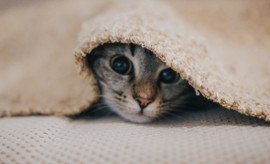Brandon Forder
 As the loving owner of three rescue kitties, I really enjoy the bonds I have created with them, and the quality time we spend together is meaningful. Whether they are snuggly and affectionate, or are a little more standoffish, there is no denying the uniqueness of cat ownership.
As the loving owner of three rescue kitties, I really enjoy the bonds I have created with them, and the quality time we spend together is meaningful. Whether they are snuggly and affectionate, or are a little more standoffish, there is no denying the uniqueness of cat ownership.
Part of being a loving cat owner is being responsible for their care. Unfortunately for all us cat owners out there, that also means we have to deal with litter boxes. You simply cannot have one without the other, as cats and litter boxes go hand in hand.
Many assume that all cat litters are the same, however that couldn’t be further from the truth. While all cat litters are intended to serve the same purpose, some of the additives in cat litters may be detrimental to the health of both you and your cat.
Surprisingly, there is a real lack of studies measuring how kitty litter may affect the health of humans and cats. However, from an anecdotal perspective, there seems to be a growing concern among cat owners, veterinarians, and physicians alike.
The most popular type of cat litter is made from clay. While clay litters are inexpensive and certainly fulfill their intended purpose, they are not made from only clay, and many contain additives that may contribute to certain health problems in pets and people. Clay litters can contain any number of additives, including sodium bentonite, silica, dust reducers, clumping enhancers, artificial scents and fragrances, and more.
Some of the common additives found in many of today’s popular kitty litters can have long-lasting repercussions. Sodium bentonite, the most common additive in cat litter, may cause irritability in the respiratory system, primarily the nose and lungs. Silica-based additives are highly dangerous if inhaled, and can lead to a type of lung disease called silicosis. With silicosis, as silica builds up in the lungs, it causes scarring of sensitive lung tissue, resulting in breathing difficulties.
Feline asthma (or feline allergic bronchitis) is a growing problem, affecting up to 5% of domesticated cats in North America. Litter dust can be a major problem for both cats and humans with asthma as it causes irritation of the airways, increasing the risk of an asthma attack.
Pretty scary stuff to think about, which is why I recommend to always wear a protective mask when you tend to the litter box. Whether it’s pouring new litter into the box, or scooping existing litter out, agitating litter causes dust no matter how ‘dust free’ the manufacturer advertises.
We can wear masks to lower the risk of exposure to harmful dust particulates in the air, but what about our cats? They are in much closer contact with their litter than we are, and obviously having our cats wear masks is not an option (but would be really interesting to see!)
So how do we protect our cats’ from inhaling litter dust that may lead to poor respiratory health?
The smart option is to change from a clay-based litter to one of the many non-clay-based alternatives on the market. Whether they are made from wheat, corn, recycled paper, reclaimed wood, and more, these alternative litters are ideal for significantly reducing litter dust and potentially harmful airborne particles.
While non-clay based litters may come with a higher upfront cost, the real value is in their health benefits. A high quality alternative litter will provide the same hassle-free scooping of clumps and effective odour control just as well as any clay-based litter, without the harmful litter dust.
While my next point doesn’t pertain to our respiratory health, it does pertain to the health of the planet. Clay litters are made by the destructive process of strip mining. In order to gain access to clay located in the ground, large machines decimate the surrounding land, including landscapes, forests, and wildlife ecosystems. The end result is contaminated land that remains unusable for years. Clay is not a renewable resource, unlike wheat, corn, and wood based litters, so when we think of long-term sustainability, clay is not the best choice for the planet.
So the next time you visit your favourite pet supply store for your bag of kitty litter, give some serious consideration to what it is made from, and be aware of the potential risks we may be exposing both ourselves and our pets to. We all share the responsibility of protecting the health of ourselves, our pets, and the planet. Every effort counts!
Brandon Forder, known as The Pet Expert, is vice-president of Canadian Pet Connection, an industry leader in healthy pet lifestyles. Brandon holds multiple certifications in pet nutrition, and has more than twenty-five years’ experience specializing in pet health and behaviour. He has written hundreds of informative pet-related articles for newspapers, magazines, radio, and the popular Ask the Pet Expert Blog. Brandon is highly skilled in pet problem solving, and enjoys teaching others about smart and responsible pet ownership. To learn more, visit www.CanadianPetConnection.ca.












